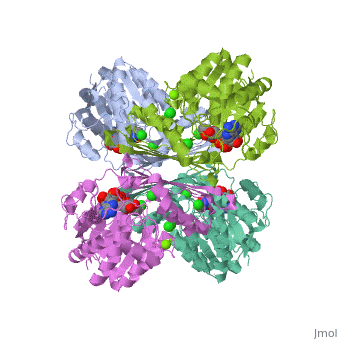Group:SMART:Tangible Models of Cdc42 Interacting With Intersectin
Tangible Models of Cdc42 Interacting With Intersectin Tangible Models of Cdc42 Interacting With Intersectin
A Lincoln HS SMART Team Telling a Molecular Story --- from the Madison West High School 2008 SMART TeamA Lincoln HS SMART Team Telling a Molecular Story --- from the Madison West High School 2008 SMART Team
- Abraham Lincoln High School, San Francisco, California
- Students -- Cyndi He, Glen Huynh, Aissa Isana, Bradley Jann, Bradford Li, Yaqiao Li, Calvin Ng, Tiffany Saw, Elizaveta Sergeeva, Jacqueline Tam, Allison Trinh, Michelle Xie, Ellen Zhang:
- Teacher -- Julie Reis
- Mentors:
- UCSF Science and Health Education Partnership -- Sabine Jeske
- UCSF/UCB Joint Graduate Group in Bioengineering -- Angela Chau
- Institute for Neurodegenerative Diseases, UCSF -- Kurt Giles
- Center for BioMolecular Modeling, Milwaukee School of Engineering -- Shannondoah Colton
Replace the PDB id after the STRUCTURE_ and after PDB= to load
and display another structure.
| |||||||||
| 3cin, resolution 1.70Å () | |||||||||
|---|---|---|---|---|---|---|---|---|---|
| Ligands: | , , | ||||||||
| Gene: | TM1419, TM_1419 (Thermotoga maritima MSB8) | ||||||||
| Activity: | Inositol-3-phosphate synthase, with EC number 5.5.1.4 | ||||||||
| |||||||||
| |||||||||
| Resources: | FirstGlance, OCA, RCSB, PDBsum, TOPSAN | ||||||||
| Coordinates: | save as pdb, mmCIF, xml | ||||||||
MSOE Center for BioMolecular Modeling and SMART TeamsMSOE Center for BioMolecular Modeling and SMART Teams


SMART Teams (Students Modeling A Research Topic) is a science outreach program developed by the MSOE Center for BioMolecular Modeling. In this program, teams of high school students work with a local resarch lab to design and build a physical model of a protein that is being investigated by the lab. The goal of the SMART Team program is to introduce students to the real world of scince --- as it exists in a local research lab. The development of this program was supported by grants from the NIH-NCRR SEPA program (Science Education Partnership Award) and an HHMI Precollege Science Education Award. For more information about this program, visit the CBM web site at www.rpc.msoe.edu/cbm .

